INTERNACIONAL
Time is running out to stop Iran from making nuclear bomb: ‘Dangerous territory’

President Donald Trump on Monday said the situation with Iran is entering «dangerous territory» as he announced his administration would be talking to Iran on Saturday.
While it’s not yet known what the talks will achieve, experts continue to warn that time is running out to not only block Iran’s nuclear program but to utilize existing tools to counter Tehran’s dismissal of international law, a mechanism known as «snapback» sanctions.
«This is the one time that we have the ability to sort of put new sanctions on Iran where we don’t need Russia and China’s help, and we can just do it unilaterally,» Gabriel Noronha of the Jewish Institute for National Security of America told Fox News Digital. Noronha is an Iran expert and former special advisor for the Iran Action Group at the State Department.
The ability to employ snapback sanctions on Iran expires Oct. 18, 2025, which coincides with when Russia will lead the United Nations Security Council (UNSC) presidency for its rotational one-month stint.
The United Nations Security Council (Reuters/Stephani Spindel/File)
TRUMP, NETANYAHU TO MEET AT WHITE HOUSE AS ISRAEL SEEKS TARIFF RELIEF, DISCUSSIONS ON IRAN, GAZA HOSTAGES
The provision for snapback sanctions was enacted under UNSC Resolution 2231, which was agreed to just days after the Joint Comprehensive Plan of Action (JCPOA) was signed in 2015 as a way to ensure that if Iran was found to be violating the nuclear deal, stiff international sanctions could once again be reimposed.
The JCPOA has increasingly been considered a collapsed agreement after the U.S. withdrew in 2018 under the first Trump administration, followed by increasingly flagrant violations by Iran of the nuclear deal.
This has culminated in the rapid expansion of Tehran’s nuclear program and the assessment by the U.N. nuclear watchdog earlier this year that Tehran had amassed enough near-weapons-grade uranium to develop five nuclear weapons if it were to be further enriched.
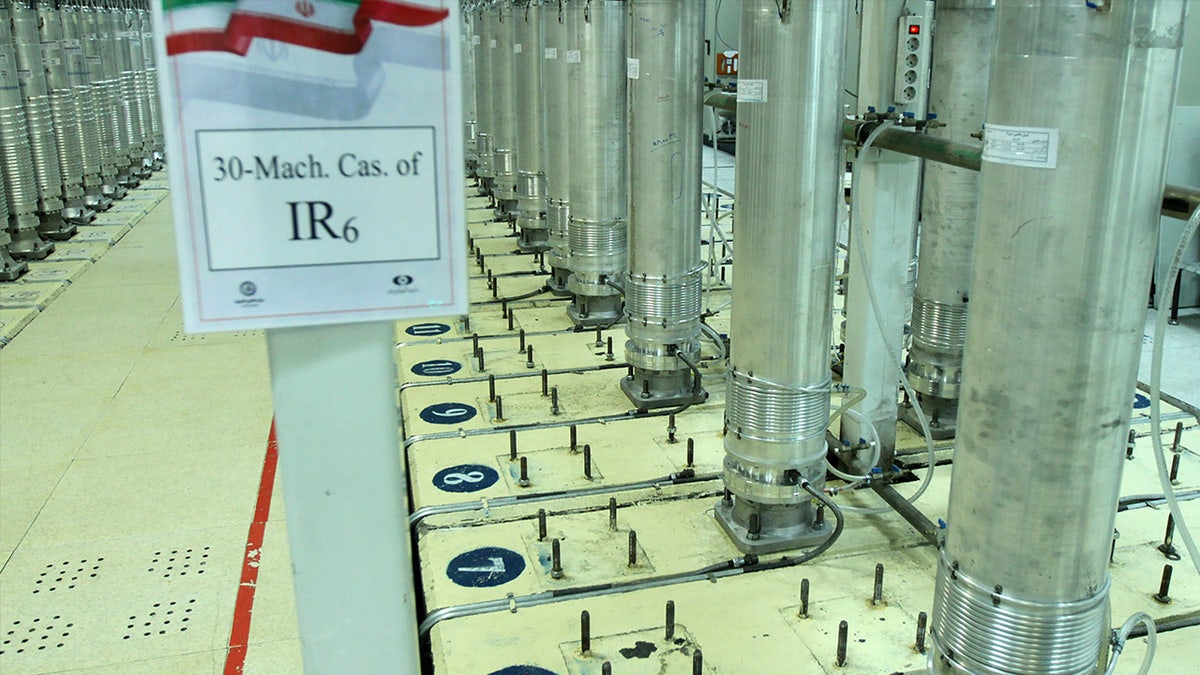
Centrifuge machines are shown in the Natanz uranium enrichment facility in central Iran in 2019. (Atomic Energy Organization of Iran via AP)
European nations for years have refused to enact snapback sanctions in a move to try and encourage Tehran to come back to the negotiating table and diplomatically find a solution to end its nuclear program.
Any participant in the JCPOA can unilaterally call up snapback sanctions if Iran is found to have violated the terms of the agreement. But the U.S., which has been calling for snapbacks since 2018, was found by the U.N. and all JCPOA members to no longer be legally eligible to utilize the sanction mechanism after its withdrawal from the international agreement.
But as Iran continues to develop its nuclear program, the tone among European leaders has also become increasingly frustrated.
France’s foreign minister last week suggested that if Iran did not agree to a nuclear deal and halt its program, then military intervention appeared «almost inevitable.»

The Foundation for Defense of Democracies has analyzed where Iran’s nuclear infrastructure is located. (Foundation for Defense of Democracies)
EXPERTS WARN IRAN’S NUCLEAR DOUBLE-TALK DESIGNED TO BUY TIME, UNDERMINE US PRESSURE
«Iran must never acquire nuclear weapons,» Foreign Minister Jean-Noel Barrot reportedly told France’s Parliament on Wednesday.
«Our priority is to reach an agreement that verifiably and durably constrains the Iranian nuclear program,» he added.
It remains unclear how much longer European nations will attempt to hold out for discussions with Iran, as Trump has said he is becoming fed up with Tehran and has threatened direct military confrontation, even while he has made clear his administration’s willingness to discuss a deal with Tehran.
With France serving as UNSC president in April and the bureaucratic red tape Russia could employ, UNSC members supportive of blocking Iran’s nuclear program must immediately call up snapback sanctions, Noronha said.
«It takes about six weeks to actually be implemented properly,» said Noronha, author of «Iran Sanctions, U.N. Security Council Resolution 2231, and the Path to Snapback,» which was released last week. «And second, because the distribution of the presidencies and leadership of the U.N. Security Council is weighted towards more favorable leaders right now in the spring before it goes to pretty adversarial leadership in the summer and fall.»
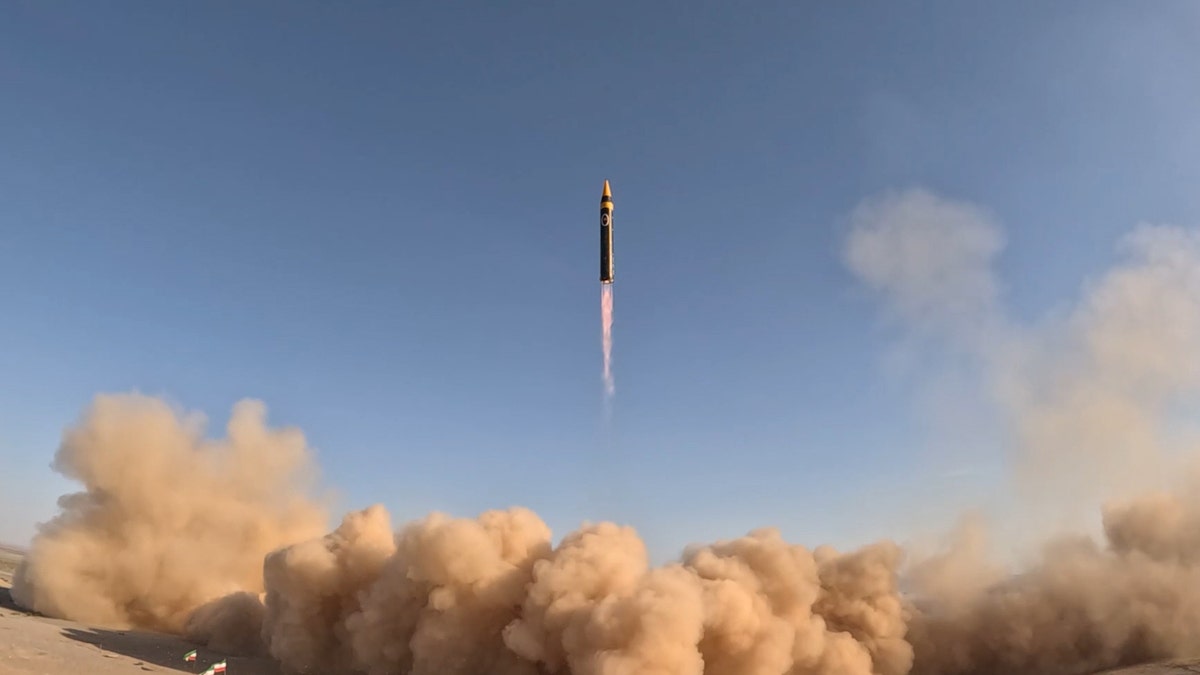
An Iranian medium-range ballistic missile called Hayber (Hurremshahr-4) is seen after launch in Tehran on May 7, 2023. (Iranian Defense Ministry/Hanodut/Anadolu Agency via Getty Images)
The expert said this is a rare moment for the UNSC, which in recent years has become increasingly ineffective in accomplishing major geopolitical wins because it is generally divided between the U.S., U.K. and France on one side and Russia and China on the other.
A single veto is enough to block a resolution being enacted, and progress in the council has become stagnant following Russia’s invasion of Ukraine.
But even if Russia objects to reimposing sanctions on Iran, as Tehran has become a close ally of Moscow’s, it actually has very few options for blocking the snapback mechanism that it previously agreed to, so long as at least one other nation actually calls for the sanction tool.
CLICK HERE TO GET THE FOX NEWS APP
«This is the only time this has ever happened at the U.N. before,» Noronha said. «They basically said, when we invoke snapback, what it does is it says U.N. sanctions will automatically return unless there’s a vote by the council to unanimously allow sanctions relief to remain on the books.»
The snapback mechanism would legally enforce all 15 UNSC member nations to reimpose sanctions on Iran, including Russia and any nation that may be sympathetic to Tehran.
If the snapback mechanism expires come October, the U.N.’s hands will likely be tied when it comes to countering Iran’s nuclear program, as it is unlikely any new resolutions on the issue will be able to pass through the council given the current geopolitical climate between the West and Russia.
INTERNACIONAL
Las autopsias de los médicos de Gaza asesinados por tropas israelíes muestran que algunos recibieron disparos en la cabeza

Autopsias
Atados
INTERNACIONAL
Trump hosts faith leaders for Easter prayer dinner, slams effort to rid America of Christian principles
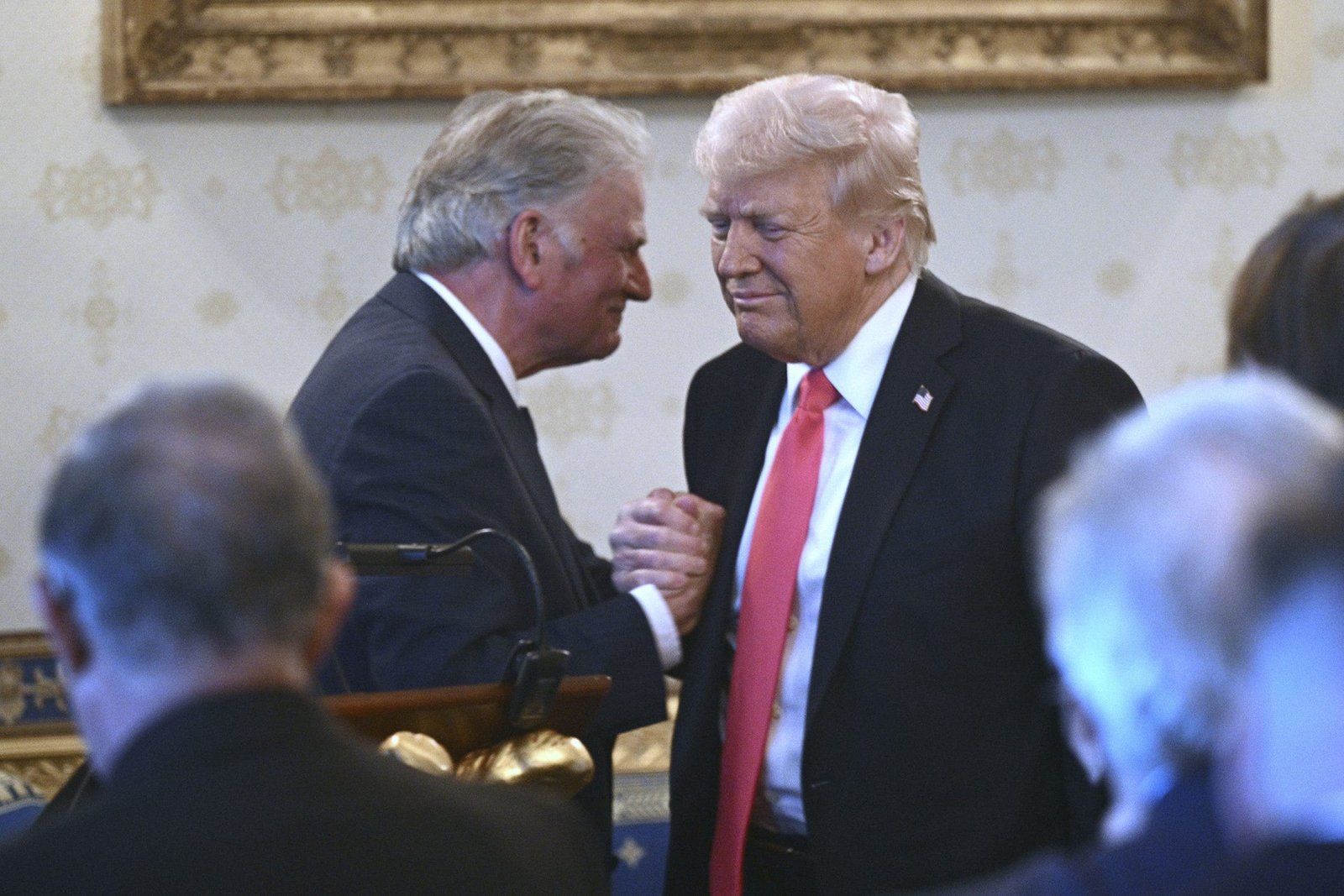
President Donald Trump participated in a Wednesday evening prayer service and dinner as part of a series of Holy Week events ahead of Easter Sunday this weekend.
Faith leaders of various Christian denominations were present and listened to the president address them about the importance of faith, both in governing and in people’s personal lives. Trump also took the moment to tout his recent accomplishments in-line with Christian beliefs, and slammed efforts to move the country away from its Christian foundation.
«This is really — I hope — going to be one of the great Easters ever, because we have something going that I don’t think this country has seen in 100 years. And as we gather with family and friends, we’ll not forget the true source of our joy and our strength: America has put our trust in God,» Trump said during his address to attendees. «It will always be ‘In God We Trust.’ We will never change that.»
INSIDE DONALD TRUMP’S RELATIONSHIP WITH GOD, IN HIS OWN WORDS: ‘I WAS SAVED’
«You know there’s a movement to change it,» Trump continued. «It won’t happen. We won’t let that happen. Can you imagine a movement to change that?»
President Donald Trump attends an Easter prayer service and dinner in the Blue Room of the White House in Washington, Wednesday, April 16, 2025. (Pool via AP)
Trump also slammed former administrations for failing to stand up for persecuted Christians around the globe, reassuring the crowd of faith leaders in attendance that things would be different under his administration.
«We had nobody fighting for our Christians in other parts of the world, that were being so incredibly destroyed, killed, injured, hurt. But they died, so many died. You wouldn’t think that could happen in this time — in this modern time,» Trump said.
Trump also remarked about the anti-Christian bias exhibited in the U.S., pointing out to those in attendance that he established a Justice Department task force to root it out. Trump also touted his creation of the White House Faith Office, which replaced the former White House Office of Faith-Based and Neighborhood Partnerships.
TECH COMPANY REVERSES POLICY AFTER CHRISTIAN GROUP SUES FOR RELIGIOUS DISCRIMINATION
«You don’t hear about that very much, but there is anti-Christian bias,» Trump said.
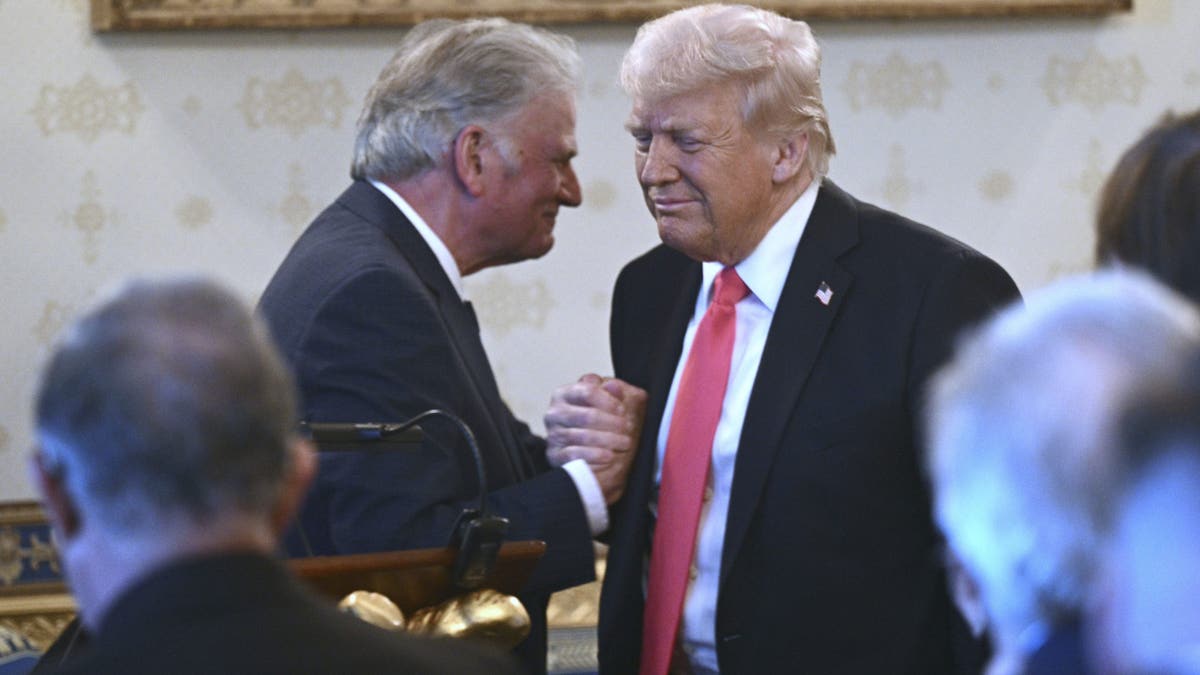
President Donald Trump greets Rev. Franklin Graham during an Easter prayer service and dinner in the Blue Room of the White House in Washington, Wednesday, April 16, 2025. (Pool via AP)
Trump will continue his Holy Week celebrations with another prayer service tomorrow, on Holy Thursday, which will again include various faith leaders from different Christian denominations and members of the president’s staff. The event will include Christian hymns sung by musicians associated with Liberty University, a private Christian university in Virginia.
The White House is also reportedly hosting a Passover event Thursday afternoon, to celebrate the Jewish holiday that began April 12 and ends April 20.
«With God’s help we can overcome every challenge, triumph over every evil, and restore the spirit of faith in the United States for generations to come,» Trump concluded. «We have a very simple slogan: ‘Make America Great Again,’ and that’s exactly what we’re doing.»
TRUMP CHAMPIONS JESUS’ ‘MIRACULOUS RESURRECTION’ IN PALM SUNDAY MESSAGE VOWING TO ‘DEFEND THE CHRISTIAN FAITH’
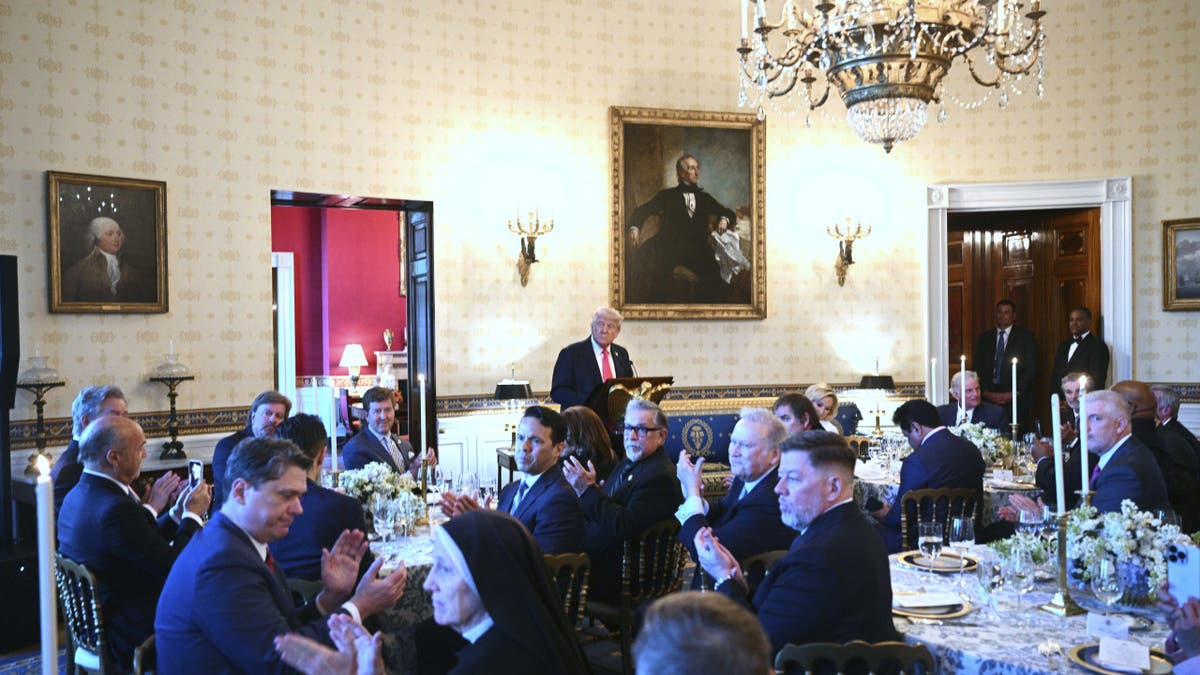
President Donald Trump speaks at an Easter prayer service and dinner in the Blue Room of the White House in Washington, Wednesday, April 16, 2025. (Pool via AP)
In addition to faith leaders, Patty Morin, whose daughter’s death at the hands of an illegal immigrant in 2023 was a major point of contention during the last election, was also present at the Wednesday dinner service. She attended following an emotional press briefing earlier in the day at the White House during which she told her daughter’s story.
«Her daughter’s looking down on Patty today,» Trump noted during the event, adding she’s «been through hell.»
CLICK HERE TO GET THE FOX NEWS APP
White House,Holiday,Donald Trump,Religion,Politics
INTERNACIONAL
La incertidumbre por los aranceles “sin dudas” afectará la economía global, según el presidente del Banco Mundial

La incertidumbre generada por la ola de aranceles impuestos por Donald Trump afectará “sin duda” el crecimiento económico global, dijo el miércoles el presidente del Banco Mundial, antes de la reunión semestral de autoridades económicas que se celebrará la próxima semana en Washington.
“La incertidumbre y la volatilidad contribuyen sin duda a un entorno económico y empresarial más cauteloso”, declaró Ajay Banga a la prensa, en alusión a las turbulencias que sacuden los mercados generada por la nueva política arancelaria de la administración estadounidense.
Esta incertidumbre provocará “sin duda” un crecimiento más lento de lo previsto, añadió durante el evento virtual.
Las Reuniones de Primavera del Banco Mundial y el Fondo Monetario Internacional (FMI) comienzan el lunes.
Sin embargo, la reunión de ministros de economía y banqueros centrales se celebrará en un contexto internacional complejo, ya que la política arancelaria del presidente estadounidense amenaza con descarrilar el crecimiento económico en muchas partes del mundo.
Desde que asumió el cargo en enero, Trump ha impuesto gravámenes del 25% a varios sectores, como el automotriz, el acero y el aluminio, para tratar de corregir lo que considera una relación comercial injusta con el resto del mundo.
La Casa Blanca también impuso un nuevo arancel de referencia del 10% a la mayoría de los países y anunció mayores impuestos a las importaciones para decenas de socios comerciales, que luego decidió poner en pausa por tres meses.
China, el tercer socio comercial más importante de Estados Unidos, se ha visto afectada por una avalancha de nuevos aranceles hasta situarse en el 145%. Beijing, a su vez, ha anunciado impuestos aduaneros de represalia del 125% sobre los productos estadounidenses.
Estados Unidos es el principal accionista del Grupo Banco Mundial e, históricamente, ha sido un impulsor clave de las políticas de la institución con sede en Washington.

Poco antes de dejar el cargo, el gobierno de Joe Biden comprometió a Estados Unidos a aportar 4.000 millones de dólares en nuevos recursos para la agencia del Banco Mundial que aprovecha los fondos de donantes para otorgar préstamos y subvenciones a algunos de los países más pobres del mundo.
Hasta ahora, el gobierno de Trump se ha negado a cumplir con la promesa de su antecesor, lo que genera dudas sobre la cantidad de dinero que planea aportar al Banco Mundial y a otras instituciones financieras internacionales como el FMI.
El miércoles, Banga indicó que el Banco se conformaría con una financiación menor de Estados Unidos, pero que aún mantiene la esperanza de que Washington cambie de postura.
“Estamos manteniendo un diálogo constructivo con el gobierno estadounidense”, afirmó. “No sé cómo terminará esto, pero no tengo ningún problema con el diálogo que estoy manteniendo”.
Trump ha cuestionado repetidamente que el planeta sufra un cambio climático provocado por el ser humano.
Desde su regreso a la presidencia, ha surgido la preocupación de que esta posición pueda golpear el presupuesto del Banco Mundial, que se ha comprometido a aumentar su cartera de financiación climática al 45% del total de préstamos.
Banga declaró a la prensa el miércoles que, si bien “las palabras pueden ser problemáticas para algunos”, los compromisos climáticos reales del Banco deberían ser menos controvertidos.
“No estamos quitando fondos a la educación, las escuelas ni al desarrollo para financiar algo”, afirmó. “Lo que hay dentro del 45% es un compromiso de que la mitad, con el tiempo, se destinará a la resiliencia y la adaptación”.
Banga también sugirió que el Banco podría pronto volver a considerar la financiación de proyectos de energía nuclear y gas natural, algo que requeriría la aprobación de los países donantes.
“No hay razón para que un país de África no se preocupe por la electricidad asequible y accesible”, afirmó. Esto “incluye gas, energía geotérmica, hidroeléctrica, solar, eólica y nuclear donde tenga sentido”.
(Con información de AFP)
-

 POLITICA2 días ago
POLITICA2 días agoAndrés Malamud: “El tuit de Cristina es una confirmación de que es una minoría”
-
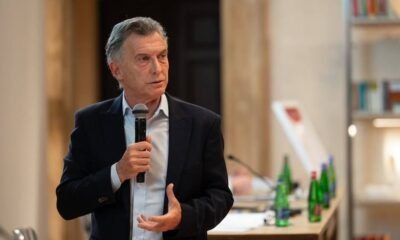
 POLITICA2 días ago
POLITICA2 días agoMauricio Macri respaldó al Gobierno por ponerle fin al cepo, pero advirtió que “habrá una devaluación”
-
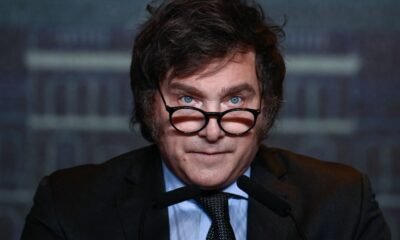
 POLITICA3 días ago
POLITICA3 días agoTras la apertura del cepo, Milei estimó: “Para la mitad del año que viene se termina el problema de la inflación”

















